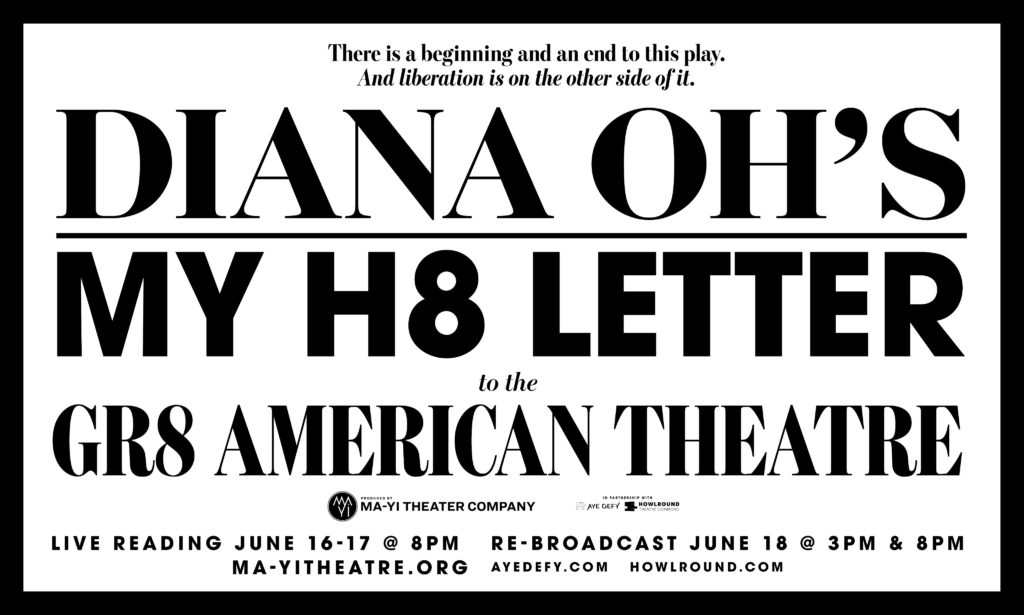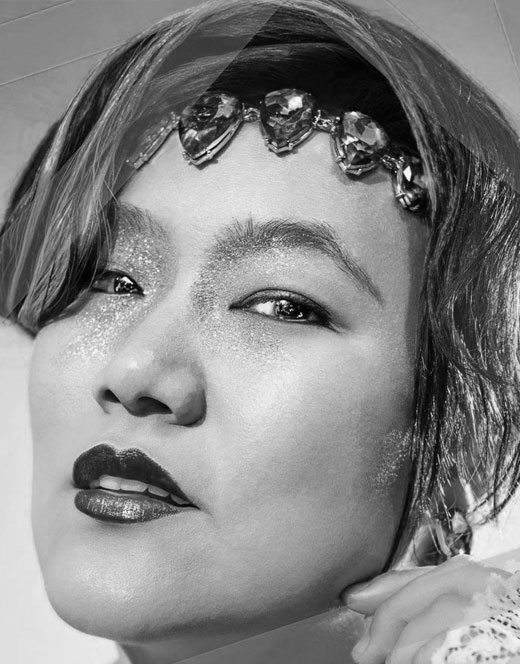
Images found on Twitter: @AyeDefy
Produced by Ma-Yi Theatre
Presented in partnership with Aye Defy and HowlRound
Written, directed and original music by Diana Oh: https://www.dianaoh.co/
June 16, 2020 – 17, 2020 at 8PM
Zoom Room opens at 7:45PM
June 18 – Rebroadcast at 3PM & 8PM
How To Watch
Response by Kitty Drexel
ZOOM — White people don’t discuss whiteness. Not in pleasant company, not even in unpleasant company. Instead, we posit race relations as a BIPOC problem. We casually block useful dialogue with a whispered, “we’re all equal under the skin,” as if saying so aloud will invoke the parasitic race-demon living under our own flesh.
*Record Scratch* No. Racism is a white supremacy problem. There is no magical phrase to summon this demon at will. It is inside us, watching our every white move. All of our moves have roots in racism; there is no opt-out option. Like Rafiki said, Racism lives in you.

Creator Diana Oh looking fly AF
BIPOC are the recipients of the hate wrought by our inability to talk like adults about a rampant, insidious issue invading every aspect of 400 years of western society’s existence. Artist Diana Oh won’t put up with our piddling, cracker-ass excuses anymore. In their recent reading of their show Diana Oh’s My H8 Letter to the Gr8 American Theatre on Zoom, Oh delivered an unrelenting, personal attack on all the aspects of theatre’s cultural white supremacy that prevent BIPOC from participating in it as fully as white folx.
The list of hurdles that BIPOC must leap while negotiating theatre’s elitist gatekeepers is long. White entitlement appeared several times in different permutations. Whites’ expectation that BIPOC take responsibility for our awakening to racism subverted many scenes. Oh subverted the white response to emotional labor because she rightly assumed we couldn’t handle a direct confrontation. This is indicative of how blissfully ignorant white people are of our own effect on the world.
Diana Oh’s My H8 Letter to the Gr8 American Theatre was a relaxed affair. The community of audience members were invited to interact with the performance via the chat. Zoom chatter was referenced in the reading. Oh and their cast only stood on ceremony to dominate it and then with displays of disappointment.
Right away, white audience members accustomed to white society’s rules of audience engagement would be put off. If one is put off by a relaxing of the 4th Wall, this show is not for you. That’s okay. There are plenty of other readings out there that are… Although, theatre is evolving.
My H8 Letter to the Gr8 American Theatre is indicative of a persistent movement of theatre that enables more off-broadway art to conform to the artist’s needs and not the majority white audience. To the shock of dozens of people who aren’t paying attention to fringe theatre, it’s happening in New England too. Good. More, please.
The reading formally opened with a parodic segment called “Ask A White Person.” Ensemble members posing as a faux audience asked questions such as, “What is it like being white?” Nessa Norich responded with flat, thoughtless answers that didn’t begin to breach the threshold of privilege that white, cis, attractive actors experience without even appreciating. This is how white feminism looks from the outside. It’s ugly and doing no one any favors. Feminism must be intersectional or it isn’t feminism.
- @AyeDefy
- @AyeDefy
Confronted with such open displays questioning, white people will feel fragility or guilt creep up on them. It’s our job to quash it in the moment because it won’t help a white person absorb My H8 Letter to the Gr8 American Theatre or any other response to racism. These useless emotions protect white people from proper introspection. You aren’t a cool white person, Karen. Your niceness to your housekeeper doesn’t exempt you from participating in the multi-level, multi-hyphenate shitshow that is the social construct of racism. Dry your eyes and keep up.
“Scene 3: Programs” was a list of “I Wish” manifesto agenda items delivered by David Zheng in the rhythm of spoken word poetry. Oh/Zheng aren’t asking for impossible things: they are asking to be seen as people with the same potential as their white, pretty colleagues. Playbill bios are boring; let’s use the space to develop personal platforms; liberal arts degrees for impossibly experience private schools and conservatories are accessible to a chosen few; the creation of good art should be financially accessible to all. Black, Asian, Indigenous, and other POC don’t have the same career footholds that white people do; theatre needs to be decolonized.
My favorite part of the evening was Oh’s brief but necessary scrutiny of the snowflakey New York Times’ critics. It fed directly into a simultaneous monologue in which token male ensemble members mansplained to each other Art/reviews. To someone who is slowly working to dismantle the Patriarchy within arts journalism from the outer circle of journalism, it was as richly satisfying as deep throating a Twinkie from the dark confines of one’s Kia Sorrento in at 1 AM in a Target parking lot. More, please.
This section didn’t need to be lengthy in order to accurately portray the dying genre that is white, male, abled, cis arts journalism. These men don’t understand yet that they are facing certain obsolescence. Their brief appearance in My H8 Letter to the Gr8 American Theatre is a reminder that art can exist whether or not The Times catches it. Artists keep creating anyway. They see us, after all.
My H8 Letter to the Gr8 American Theatre evolves into couples counseling between Oh and the Theatre (Joshua Young). Oh airs their many, legitimate grievances and the Theatre responds with sincere but empty promises to be better. Young as the Theatre was calling in from what looked like a shoebox underneath a white, cis, hetero producer’s casting couch. The background was dark and the lighting caught Young’s face and beige, linen suit. Oh raged like a merciless angel of justice. Theatre listened, calm and collected.
I could go on. All of this writing exists to convince you to see Diana Oh’s My H8 Letter to the Gr8 American Theatre. Or, to convince you to produce Oh’s show. It’s a great script for actors. Oh understands us, the actors, in ways that artists who are strictly playwrights don’t. Oh is in on the joke, and understands the joy and frustrations of interpreting a playwright’s work.
Oh understands the joy and frustrations of being in the audience too. That’s why the chat is open. The actors know we had a good time and we’re able to cheer them on in the moment. It was great.
My H8 Letter to the Gr8 American Theatre is good for audiences too. POC will see themselves in this work. White people, most of us, won’t identify with this art. We’re not supposed to. My fellow white people, there are times when we’re supposed to show up and shut the fuck up and take it. Take it so good. We have a choice to see ourselves elsewhere if we don’t like Diana Oh’s show.
Except not me. I’m physically disabled. I don’t see myself anywhere. So I have no sympathy for other white people who aren’t used to the experience. It must be difficult for you? IDC.
Since I have your attention pay these artists money. Do it now.
TL Thompson, Venmo: @Tanisha-Thompson
Tim Hall, venmo: @tv_hall
David Zheng Venmo: @ZhengLife
Michael Puzzo, Venmo: @Michael-Puzzo
Kevin Hourigan, PayPal: btfacollective@gmail.com
Ryan J. Haddad: @Ryan-Haddad-2
Alysia Reiner Venmo: @Alysia-Reiner
Nessa Norich, Venmo: @Nessa-Norich
Joshua Young, Venmo: @TotoroVsBatman
Matt Park, Venmo: @afqphotography
Diana Oh, Venmo: @ohyeadiana


